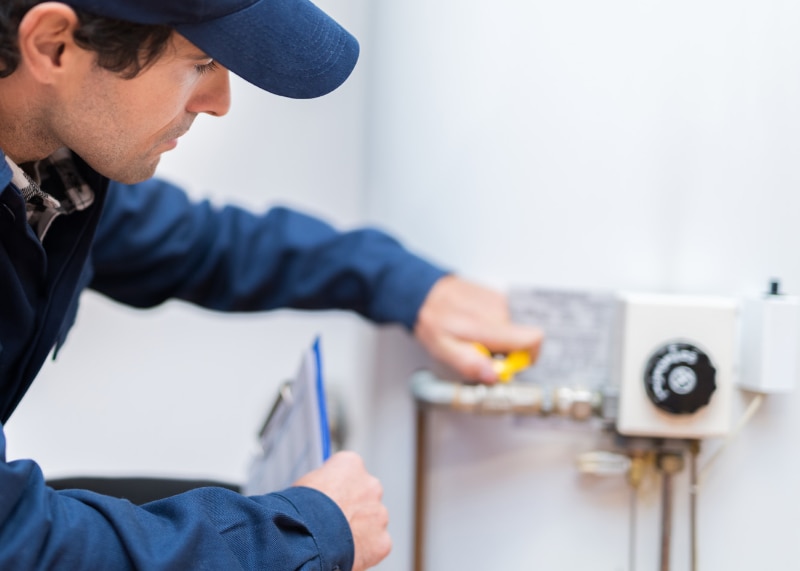Handling Everyday Water Heater Malfunctions
Handling Everyday Water Heater Malfunctions
Blog Article
What are your ideas regarding Water Heaters Problems?

Envision starting your day without your regular hot shower. That already establishes an inadequate tone for the remainder of your day.
Every residence needs a reputable hot water heater, yet only a few understand just how to manage one. One easy means to keep your hot water heater in leading shape is to check for faults on a regular basis and fix them as soon as they show up.
Bear in mind to switch off your hot water heater prior to sniffing around for faults. These are the hot water heater mistakes you are probably to encounter.
Water too hot or too cool
Every hot water heater has a thermostat that establishes just how hot the water gets. If the water entering your home is also hot despite setting a convenient optimum temperature, your thermostat might be damaged.
On the other hand, also cold water might be because of a failed thermostat, a damaged circuit, or incorrect gas flow. For example, if you use a gas hot water heater with a busted pilot burner, you would certainly obtain cold water, even if the thermostat remains in best problem. For electric heating systems, a blown fuse may be the offender.
Insufficient warm water
Hot water heater come in several sizes, depending upon your warm water needs. If you lack warm water before everybody has actually had a bath, your hot water heater is too small for your family size. You need to take into consideration mounting a bigger water heater storage tank or selecting a tankless hot water heater, which occupies less room and is extra durable.
Unusual noises
There are at the very least 5 kinds of sounds you can speak with a hot water heater, however the most common analysis is that it's time for the water heater to retire.
First off, you must know with the regular appears a water heater makes. An electric heating unit may sound various from a gas-powered one.
Popping or banging sounds typically mean there is a piece of debris in your containers, and it's time to clean it out. On the other hand, whistling or hissing sounds may just be your shutoffs allowing some stress off.
Water leakages
Leakages might originate from pipelines, water links, valves, or in the worst-case situation, the container itself. In time, water will corrode the tank, and locate its escape. If this occurs, you need to change your hot water heater immediately.
However, prior to your modification your entire storage tank, make sure that all pipelines remain in location and that each valve works completely. If you still need help determining a leakage, call your plumber.
Rust-colored water
Rust-colored water suggests one of your hot water heater components is corroded. Maybe the anode rod, or the container itself. Your plumber will certainly have the ability to recognize which it is.
Lukewarm water
Regardless of how high you established the thermostat, you won't obtain any warm water out of a heater well past its prime. A water heater's efficiency may lower with time.
You will likewise obtain lukewarm water if your pipes have a cross connection. This implies that when you turn on a tap, warm water from the heating system moves in together with routine, cold water. A cross connection is very easy to place. If your hot water faucets still pursue closing the water heater shutoffs, you have a cross connection.
Discoloured Water
Rust is a significant root cause of dirty or discoloured water. Corrosion within the water container or a stopping working anode rod could trigger this discolouration. The anode pole shields the storage tank from rusting on the within as well as need to be inspected annual. Without a rod or an effectively working anode pole, the hot water promptly corrodes inside the storage tank. Call an expert hot water heater specialist to figure out if changing the anode pole will take care of the trouble; otherwise, change your water heater.
Conclusion
Ideally, your water heater can last ten years before you need a modification. Nevertheless, after the 10-year mark, you might experience any one of these faults much more on a regular basis. Now, you need to include a new water heater to your budget.
How To Troubleshoot 3 Common Water Heater Problems in Twin Cities
The Water Heater Is Leaking
A leaky cold water inlet valve A loose pipe fitting A leaky temperature and pressure relief valve A corroded anode rod A cracked tank Turn Off Your Water Heater:
Shut off your gas water heater by turning the gas valve on the unit to the “OFF” position. Shut off your electric water by switching its power off at your electrical panel. Look for a two-pole breaker labeled “water heater” and turn it to the “OFF” position. Move the ball valve connected to the water heater to be perpendicular to the piping at a 90° angle. Look for the Leak:
Depending on whether the water is coming from the tank's top or bottom, you’ll want to look for the leak in different locations.
If the leak comes from the top of the tank, carefully look for water escaping from the cold water inlet valve or loose pipe fittings. Rusted hot and cold water valves can have loose connections with the tank, with water leaking out of them.
https://mspplumbingheatingair.com/blog/how-to-troubleshoot-3-common-water-heater-problems
I hope you liked our post on Water Heater Repair and Troubleshooting. Thanks a lot for finding the time to read through our posting. Do you know about another individual who is in the market for Common Problems with Your Home Water Heater? Take a moment to share it. I recognize the value of reading our article about Common Problems with Tank Water Heaters.
Schedule Estimate Report this page